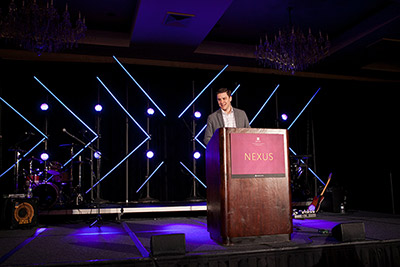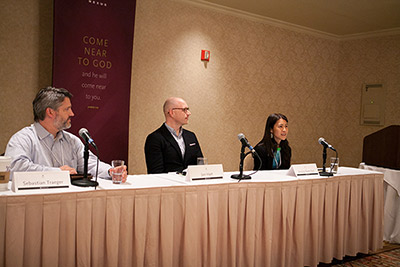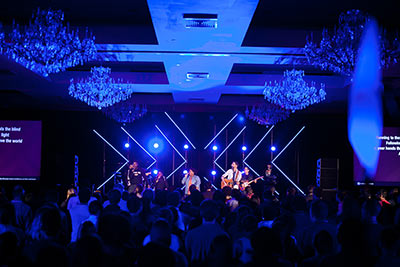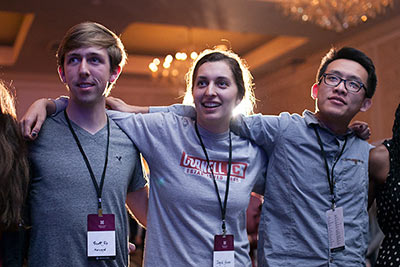By Eileen Scott, Senior Writer
 Nexus: The Christian Union Conference on Faith and Action explored the convergence of culture, career, and Christianity for 317 students from some of the nation's most influential universities.
Nexus: The Christian Union Conference on Faith and Action explored the convergence of culture, career, and Christianity for 317 students from some of the nation's most influential universities.The Omni Hotel in New Haven, Connecticut, just a couple blocks from Yale University, was home to a weekend of vibrant worship, continuous and intercessory prayer and engaging messages from powerful plenary speakers on April 1-3. Students from Brown, Columbia, Cornell, Dartmouth, Harvard, Penn, Princeton, and Yale attended the conference, which offered insight, inspiration, networking, and practical advice on discerning God's purpose for life, campus, and career. A variety of vocational panels were led by highly qualified Christians in fields such as the arts, computer science and technology, education, finance, government, law, media, medicine, and science and engineering.

Running concurrently with the student conference was Nexus 2016: The Christian Union Conference for Professionals. Here, recent graduates and believers in the marketplace were offered compelling ideas about faith and its relevance to work and the broader culture. City Christian Union, the host of the event, is developing networks of Christian leaders who seek to transform culture in the nation's most influential cities. Nexus provides one avenue of bringing together those like-minded individuals.
At the Nexus student conference, plenary speakers exhorted attendees to live with extraordinary faith by encouraging them to dance with destiny, recalibrate their hearts, run with their eyes on Christ, and seek social justice.
Opening speaker Bishop Harry Jackson, who earned his MBA from Harvard, brought a message of peace and encouragement to students. Jackson, one of the chief conveners of The Reconciled Church Initiative and the founder and chairman of the High Impact Leadership Coalition, spoke to students about "Dancing with Destiny."
"There is a purpose for your life," he said. "When people see you, they should say you were made to do that [vocation]. They should see the handprint of the Creator upon you as you do what you do. That is dancing with destiny."
 "I loved his energy and charisma," said Julia Zhu, Penn '17. "It was reassuring to hear about how God has a plan for us and that we won't fail as long as we follow [that plan]. That really hit me."
"I loved his energy and charisma," said Julia Zhu, Penn '17. "It was reassuring to hear about how God has a plan for us and that we won't fail as long as we follow [that plan]. That really hit me."Arthur Mensah, Dartmouth '19, agreed. "The topic was relevant to all of us college students," he said. "We are at the point where some of us aren't sure what we want to do with our lives going forward. The message of God having you, regardless of what you do, was very reassuring."
On Saturday morning, James K.A. Smith, professor of philosophy at Calvin College, challenged students with a presentation entitled, "You Are What You Love: The Spiritual Power of Habit." The scholar and author explained that humans are shaped more by what their hearts love and long for, rather than by what they think or believe.
According to Smith, "Our most fundamental orientation to the world is love; love is one way of naming our deepest longings and cravings." The heart, he said, is like a compass which needs to recalibrate throughout life to ensure it is always set toward the Kingdom of God.
"We need to orient our desires to God and what He desires for His creation," Smith said.

The philosopher told the students that loving God with one's mind was not enough.
"Wow, I never really thought of it that way," said Madison Sabol, Dartmouth '18 "I have always thought that by pursuing more knowledge, I would be a better Christian. But [Smith] really challenges that. You do need knowledge, but he is saying, 'you need to surpass this knowledge' and that's something I never even considered."
Brandon Thompson, Cornell '16, also took heed of what both Smith and Jackson had to say, and believes it is applicable to his remaining time at Cornell and his future career as an attorney.
"I have to be really intentional about moving on from here and about seeking after God," he said. "But knowing that He sought after me first and has me in His hand is really comforting."
As for living out his Christianity in the field of law, Thompson said, "I'm cognizant of doing what's right, not only in the world's eyes, but in God's eyes, and relying on Him in all things."
On Saturday evening, Jim Black, Christian Union's ministry director at Columbia University, spoke from Hebrews 11-12 and exhorted students to return to their campuses and be prepared to spiritually "run" on Monday morning. Acknowledging that distance running is not easy, he encouraged them to lean upon the "great cloud of witnesses" that surrounded them at the conference and to look unto Jesus, the author and finisher of their faith.
"Where you look when you run determines where you end up," Black said.
The message resonated with Renee Drago, Cornell '16, a biomedical engineering major. Drago, a member of Christian Union's leadership development ministry at Cornell, is happy to have a caring community of believers at her school who are quick to encourage and pray for her. At Nexus, she also learned the importance of continuing the race with fellow believers when she enters the workforce.
"You need to engrain yourself in the community and begin to serve almost immediately," Drago noted. "That's how you find that cloud of witnesses."
Baroness Caroline Cox, a member of the House of Lords and chief executive of Humanitarian Aid Relief Trust, gave the final plenary address, a compelling presentation about "Heroes on the Front Line of Faith and Freedom." The advocate for the persecuted church brought her audience on a pictorial journey through oppressed lands in Burma and the Sudan, sharing images of smiling brothers and sisters in Christ who were gaunt with starvation and suffering for their faith.
The vibrant 79-year-old also shared first-hand accounts of bringing aid by way of harrowing truck rides on the edges of cliffs in the dark and frigid region of Burma. "But it was all worth it," she said.
The presentation was a profoundly disturbing yet encouraging story of hope and perseverance. It was also a clear reminder that to whom much is given, much is expected.
"William Wilberforce's work is not done," Cox told her audience. "Wilberforce did his job in his day (by working to abolish the slave trade in England) and we have to do our job in our day." The Baroness encouraged the audience to pray earnestly for their persecuted brothers and sisters.
As with every Christian Union conference, prayer was paramount. A 24-hour prayer room—with lights dimmed, candles glowing, and pillows, maps, and musical instruments scattered about—invited intercession and worship. Students from each campus took turns praying throughout the conference, continually calling upon the Holy Spirit's presence and Christ's mercy. Saturday morning, Christian Union Vice President Lorri Bentch led the packed ballroom in prayer at the plenary session. Even before Nexus began, members of the Christian Union faculty embarked on a prayer walk around the hotel.
Another highlight of the weekend was SpokenWord performance. Teams and individuals from represented universities memorized large volumes of Scripture, interweaving dramatic, poetic presentations.
Christian Union Founder and CEO Matthew Bennett, Cornell '88, MBA '89, closed the conference by telling the students and professionals. "It's an honor to consider the question: How can we bless others with what God has given us?"
Students, like Lauren K. Smith of Cornell, said that question would remain with them as they returned to their schools. Smith, a senior who plans to conduct research with wildlife upon graduation, is excited to consider future possibilities.
"There are great ways to serve the Lord and live out our callings as Christians," she said. "It's really comforting to know that God has a plan."





